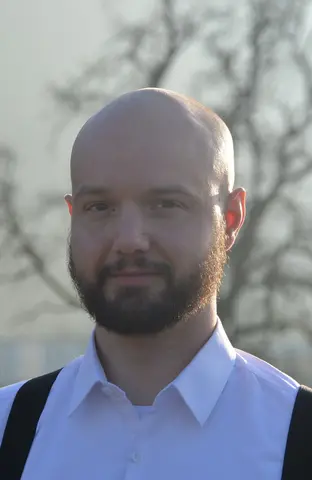Thomas Sojer
thomas.sojer@uni-erfurt.deWissenschaftlicher Mitarbeiter, Professur Philosophie (Katholisch-Theologische Fakultät)
Besucheranschrift
Universität Erfurt | Professur für Philosophie
Dienstgebäude Villa Martin | Nordhäuser Straße 63 | 99089 Erfurt
Postanschrift
Universität Erfurt | Professur für Philosophie
Dienstgebäude Villa Martin | Nordhäuser Straße 63 | 99089 Erfurt
Assoziierter Doktorand (Max-Weber-Kolleg für kultur- und sozialwissenschaftliche Studien)
Sprechzeiten
nach Vereinbarung
Besucheranschrift
Universität Erfurt | Professur für Philosophie
Dienstgebäude Villa Martin | Nordhäuser Straße 63 | 99089 Erfurt
Postanschrift
Universität Erfurt | Katholisch-Theologische Fakultät
Dienstgebäude Villa Martin | Nordhäuser Straße 63 | 99089 Erfurt

Zur Person
Curriculum Vitae
Thomas Sojer is a PhD candidate in philosophy at the IGS Resonant World-Relations and fellow at the Titus Brandsma Institute at the Radboud University Nijmegen. He is the co-founder of the trans | disziplin Simone Weil denʞkollektiv together with Prof. Martina Bengert (HU Berlin) and Max Walther (Bauhaus Universität Weimar). He has worked in research projects funded by the Flemish Science Fund (19th century mysticism and nationalist politics), the Austrian Acadamy of Sciences (early modern cultural translations), the Austrian Integration Fund (Islamic Theology in European contexts), and the Austrian Science Fund (contemplation and knowledge production). His research focuses on 20th-century French philosophy and he publishes at the intersection of (performance) art, mysticism and philosophy of religion.
Forschungsprojekt
Simone Weil's philosophical scrutinies of the New Testament
The French philosopher Simone Weil (1909-1943) thinks of human life as a cruciform existence. Weil addresses the topos of the Passion, a narrative intensively loaded with significance and an object of much philosophical thought, both outside and inside different theological and religious hegemonies of knowledge. The death of God in the Christ figure, the intellectual child of the New Testament in late modernity, does not form an object of Weil's philosophy among others but it rather turns out to signify the very subject of thought from which world and history are to be read, particularly in the context of atheistic materialism. In my PhD project, I examine Weil's philosophical scrutinies of the death narratives and interpretations of the Christ figure in the New Testament's set of textual material. Artistically and performatively Weil’s handwritten testimonies create intercultural superimpositions of sacred texts of different religions with philosophy, literature, and mythologies, arranged to play with contradictions, fractures, and epistemic voids. A combined methodological approach adds to my philosophical investigation into Simone Weil's scrutinies of the New Testament and employs concepts of literary criticism and reception studies. The close-reading of the female philosopher draws nuanced conclusions about the practices and techniques in the reception of the New Testament in 20th-century French philosophy. Simone Weil’s specific form, methods, and performances of reception and re-appropriation compel contemporary philosophical and ethical debates to depart from fixed imaginaries and interpretations of human suffering, enabling new paths, especially concerning the recent metaphysical turn in materialist thought.
Publikationen
Publikationen
- Bildung und Liebe. transcript 2018, co-edited with Nadja Köffler, Petra Steinmair-Pösel and Peter Stöger.
- Animal relationale. Studia Universitätsverlag 2017, co-edited with Gabriela Kompatscher, Thomas Seissl and Timothy King.

